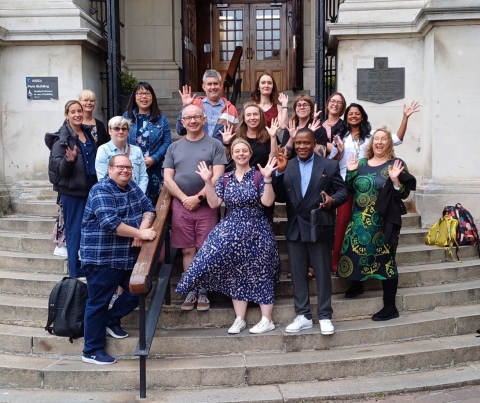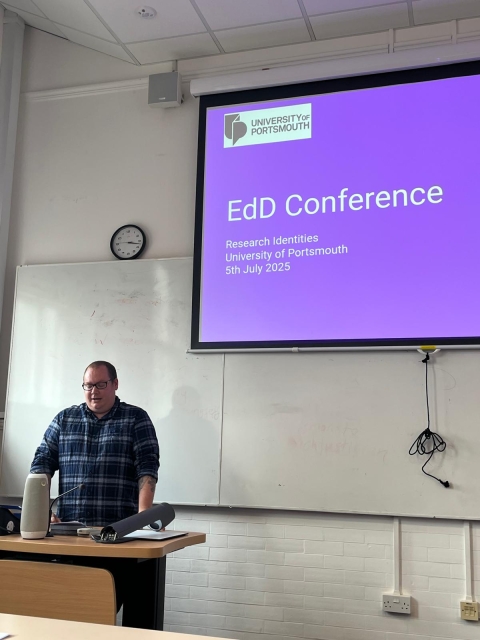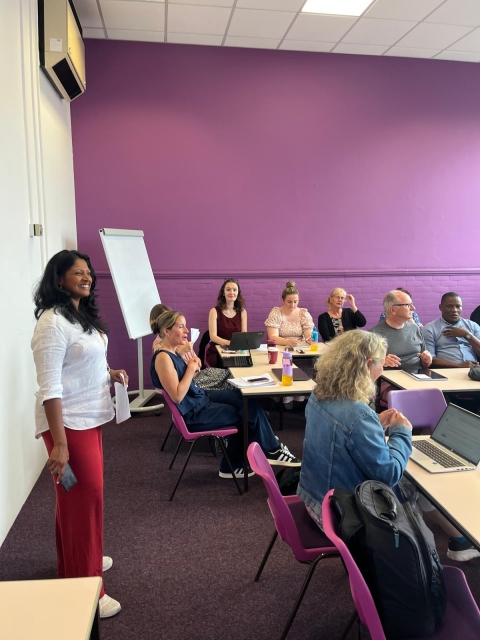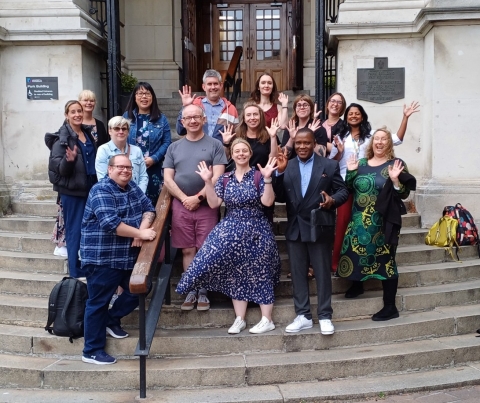

Twenty-six EdD Candidates and their teaching team gathered at the 2025 EdD Conference “Research Identities”.
3 minutes
Building upon the success of the 2024 EdD Conference, the 2025 edition, organised by Dr Angeline Dharmaraj-Savicks invited contributions on the theme of “Research Identities”.
The foreword was given by Dr Matthew Round, Interim Head of the School of Education, Language and Linguistics, former candidate of the EdD himself and successful author of the 2024 EdD Conference paper: “Being and Becoming: Praxis, Positionality and Pracademia” soon to be published in the International Journal of Social Sciences and Educational Studies.
The opening talk, entitled “The Question of Positionality in Research – Owning Our Identity”, was led by the course leader Dr Jessica Massonnie. It offered a starting point to collectively reflect on and define the key concepts underlying the 2025 Edition: Identity, Positionality and Reflexivity. It considered the tensions between “sameness” and “movement” in our definition of identity. It proposed some questions on what, and who feeds our own perception of ourselves as researchers.
The morning session took the form of a series of three talks, chaired by Dr Christopher Ricketts (in his research phase) brilliantly demonstrating reflexivity in the conceptualisation and analysis of research projects. Emma Cripps, second year candidate, shared her experience using reflexive thematic analysis, illustrating how participants’ views interacted with both her research and professional identity. She shared some useful reflexive questions to “keep in check” throughout the research process. Natalie Tracey, also in her second year shared thought-provoking ideas on whether reflexivity interacts with professionalism: Can there be too much self-awareness? To what extent is it perceived as professional by others? Within the context of her research project, her own positionality proved to be an asset to reflect on the ethical implications of concepts such as “behaviour of concern” or “oppositional defiant disorder” which are used to describe children’s behaviour. Khaled Raisi, joining us online from abroad, extended the concept of positionality across borders, touching upon the question of how citizenship status may impact the educational experience of higher education students in Qatar. This is an important question in order to consider systematic and political influences on identity building. The discussion that wrapped up this series of talks centred around the acknowledgment of personal values, the mitigation of biases and the navigation of different layers of social belonging in the family, work and educational spaces.
The early afternoon focused on workshops led by EdD candidates, chaired by Emma Cripps. First, Laura Hogben introduced her interpretation of double hermeneutics and why the researcher’s voice matters. She provided insightful examples of how participants’ narratives interacted with her conception of her own professional identity, before inviting us to map our own positionality.

Christopher Ricketts chairing the first series of presentations.

Snapshot from the EdD Conference room.
The second workshop was led by Christopher Ricketts who questioned the room about the implications of doing research from within. Activities included brainstorming on the tensions, influences, ethics and values influencing our work as researchers. Looking at the difference between reflective practice and reflexivity invited the audience to consider the intention behind self-awareness and the extent to which it is to ultimately improve our practice.
Later in the afternoon, Dr Charlotte Morris presented on the Politics of Positionality. After highlighting that positionality is embedded within our research and not an add-on, Charlotte invited the audience to reflect on it as a critical element of research integrity. Moving towards the relationship with power, attendees considered how their positionality could influence and challenge current perspectives on who/what is more or less valued, and visible.
The last talk was from Dr Ian Johnson, who successfully defended his EdD thesis in 2023, entitled: “The Framing and Value of Learning Development Work in British Higher Education: An Illuminative Evaluation of Professional Practice”. Ian shared his journey and key milestones, as well as how he navigated uncertainties related to the current social and political landscape at the time. This was a positive story to end the day with.
Overall, the conference made a significant impact in strengthening the research culture among EdD students. The day not only celebrated current academic achievements but also laid the groundwork for continued connection and support within the research community. There is strong anticipation and genuine enthusiasm among students for similar events in the future, reflecting the lasting value and success of this conference.
The full programme is available here.
We would like to thank all the EdD candidates, staff members (in particular our organizer Dr Angeline Dharmaraj-Savicks and Dr Nikki Fairchild for her generous presence and support) and the Research Cultures Team who have made this edition a success!

University of Portsmouth EdD candidates 2025.
The conference was funded by the University of Portsmouth’s Research Cultures Fund following a bid application.
Enable University alerts
Turn on notifications for critical updates like closures, safety alerts, and urgent service disruptions.






